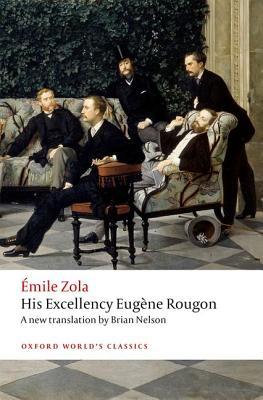A few years ago I completed Zola’s 20 volume Rougon-Macquart Cycle. As I worked my way through the 20 books, I came to the conclusion that some would forever have a place on my-best books of all-time list: The Kill, Nana, L’Assommoir, PotLuck, Money, Earth, The Ladies’ Paradise, Debacle, His Excellency, The Masterpiece, while others were bridge-books and not so memorable. At the time only some of the books were available in new or newish translations, and that left me with the 19th century Vizetelly translations. I don’t intend to knock the Vizetelly translations as the Vizetellys believed in these books, tried to publish them and were heavily penalized for their efforts.
When I discovered the shocking fact that many of the 20-volume cycle hadn’t been re-translated since the 19th century, I thought that the reason these books hadn’t been re-translated had to be because they were the minor novels in the series. But as it turns out, my theory wasn’t correct.

That brings me to the new translation of His Excellency Eugène Rougonfrom Brian Nelson. Nelson has previously translated the following novels in the series:
The Fortunes of the Rougons
The Ladies’ Paradise
Earth
The Kill
Pot Luck
The Belly of Paris
I’m excited about this translation as His Excellency Eugène Rougon is due for a reread, and what better reason than a new translation. If you want to read my review of the book, it’s here, but this post is about translation.
The main character, power-hungry Eugène Rougon has a certain attitude towards women:
Vizetelly translation:
“Yes, beware of women,” Rougon repeated, pausing after each word so as to glance at his papers. “when a woman does not put a crown on your head, she slips a halter around your neck. At our age a man’s heart wants as carefully looking after as his stomach.”
Brian Nelson translation:
“Yes, be very careful with women,” Rougon repeated, pausing after every word as he peered in a file. “If they’re not putting a crown on your head, they’re slipping a noose round your neck… At our age, a man should look after his heart as much as his stomach.”
Perhaps those two quotes don’t seem so different at first glance, but I read them both several times. In the first quote, the word “halter” evokes the imagery of a man being controlled whereas in the second quote, “noose” implies a much more terminal position. Plus then there’s that last line … “a man’s heart wants as carefully looking after as his stomach,” versus “a man should look after his heart as much as his stomach.” The matter of who is doing the care-taking of the heart is not in question in the Nelson version, as we would expect with Eugène Rougon, whereas the Vizetelly version implies that a woman could perhaps be taking care of the heart and the stomach which is in complete contradiction of Rougon’s speech.
But here’s a meatier quote:
Vizetelly translation:
“What had first attracted him in Clorinde was the mystery surrounding her, the story of a past-away life and the yearning for a new existence which he could read in the depths of her big goddess-like eyes. He had heard disgraceful scandal about her–an early love affair with a coachman, and a subsequent connection with a banker who had presented her with the little house in the Champs-Elysees. However, every now and then she seemed to him so child-like that he doubted the truth of what he had been told, and again and again essayed to find out the secret of this strange girl, who became to him a living enigma, the solution of which interested him as much as some intriguing political problem. Until then he had felt a scornful disdain for women, and the first one who excited his interest was certainly as singular and complicated a being as could be imagined.”
Nelson translation:
“What attracted him in Clorinde was the quality of the unknown, a mysterious past, and the ambition he thought he could read in her big, dark eyes. Frightful things were said about her–a first attachment to a coachman, then a deal with a banker, rumoured to have paid for her false virginity with the gift of a house on the Champs-Élysées. On the other hand, there were times when she seemed such a child that he doubted these stories. He swore he would get the truth out of her himself, and kept going back hoping to learn the truth from the strange girl’s own lips. Clorinde had become an enigma which began to obsess him as much as any delicate question of high politics. He had lived his life thus far in disdain of women, and the first woman to whom he was attracted was without doubt the most complicated creature imaginable.” *(and there’s a note here that Clorinde was modeled on the real-life Virginia Oldoini, Countess of Castiglione)
Comparing the two, IMO, the Nelson version is much smoother and also much more effectively conveys Rougon’s fascination with Clorinde. Significantly, Clorinde’s sexuality is absent from the Vizetelly quote. Back to censorship and what the Vizetellys had to deal with. Zola’s incredible, unforgettable characters are human beings who experience great passions: whether is be the passion/obsession for power, money, revenge, or sex, and it’s a shame crime against literature that the Vizetellys were forced to tone down their translations. Henry Vizetelly was convicted twice for obscenity when he published versions of Zola novels. But that was the 19th century, so I’m going to celebrate the 21st century with a re-read of His Excellency Eugène Rougon.
Review copy
